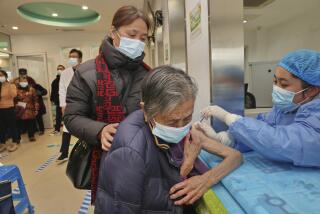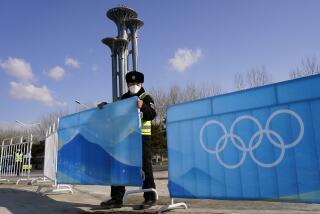Healthcare tips on China
- Share via
Visitors to the Summer Games, opening Friday in Beijing, can be assured of seeing top athletes swimming, throwing the javelin, hopping hurdles and strutting their stuff, all in the peak of health. But what if the fans aren’t feeling great or get hurt in an accident?
The outcome for foreigners who experience a medical emergency in China is not as certain. In a country profile posted at www.travel.state .gov, the State Department says, “The standards of medical care in China are not equivalent to those in the United States.”
Several experts I spoke with agreed. Besides overall quality, they said, visitors may struggle with language barriers, culture shock, spotty customer service, problems in paying for care and even counterfeit drugs.
Especially in rural areas, a foreigner’s trip through the Chinese medical system can turn into “a horrendous and daunting experience,” said Jane Poulton, senior director of China development for International SOS Assistance Inc., which helps clients obtain medical service abroad.
In mainland China, you will find the best-quality care in big cities such as Beijing, Shanghai and Guangzhou, Poulton said. And Hong Kong, she added, “is comparable to any Western city in the world.”
China, to some degree, typifies the healthcare issues that international travelers face around the world. In many countries, including the U.S. and China, visitors may be asked to pay for services on the spot. Health insurance that is good at home may be rejected abroad.
Medicare, except in very rare cases, is not accepted outside the U.S.; Medicare Advantage plans may provide some coverage.
Closer to home, Mexico, for instance, mirrors other developing nations.
“Mexico City has world-class medical facilities,” said Dr. Myles Druckman, vice president for medical services in the Americas region at International SOS. “Outside major cities, the quality drops dramatically.”
But mainland China presents its own challenges. Among them:
Hospitals: “Many Chinese doctors are equal to our own,” Poulton said. “Where the system falls down is in post-operative care and management of conditions.”
Druckman, who spent five years in Beijing with International SOS, said that in many hospitals, patients’ families are expected to bring food, change bedpans and buy medicine. He advises visitors to seek out VIP wards, also called private or foreigner wards, in big-city hospitals. Such wards charge more but have better service and more English-speaking doctors, he said.
Payment: In a guide issued to its members, International SOS says, “Doctors and hospitals will usually expect immediate cash payment. . . . Unfortunately, foreign health insurance plans are not accepted directly by the hospital.”
One exception, noted on the State Department’s website, is BlueCross BlueShield. The insurer has contracts with several hospitals in Beijing, which it lists on its website, www.bcbs.com. Coverage will vary with the plan.
Pharmacies: As in many countries, you may be hard-pressed to find U.S. drug brands or equivalents in China. But there’s another issue: fraud.
“Counterfeit pharmacies are a very prevalent problem in China,” Poulton said.
Packaging may mimic U.S. brands, so be suspicious if a drug is “really, really cheap,” she said. Better yet, buy drugs at hospitals or clinics that serve foreigners, she advised, or ask your hotel concierge, insurer or tour guide for referrals.
Given the challenges of Chinese medical care, trip insurance with health coverage can be helpful, especially if it includes medical evacuation, which can cost thousands. Or join a group that provides evacuation services, such as MedjetAssist, www.medjetassist.com, which charges $85 and up for membership.
International SOS, www.inter nationalsos.com, offers health advice and services around the world; it runs its own urgent-care clinics in China. To access these services, you must buy a membership, which starts at $80. But any traveler can phone the group’s Beijing Alarm Center, 011-86-10-6462-9100, for care referrals.
“We would rarely charge [non-members] for urgent-need advice,” Poulton said.
--
More to Read
Sign up for The Wild
We’ll help you find the best places to hike, bike and run, as well as the perfect silent spots for meditation and yoga.
You may occasionally receive promotional content from the Los Angeles Times.






